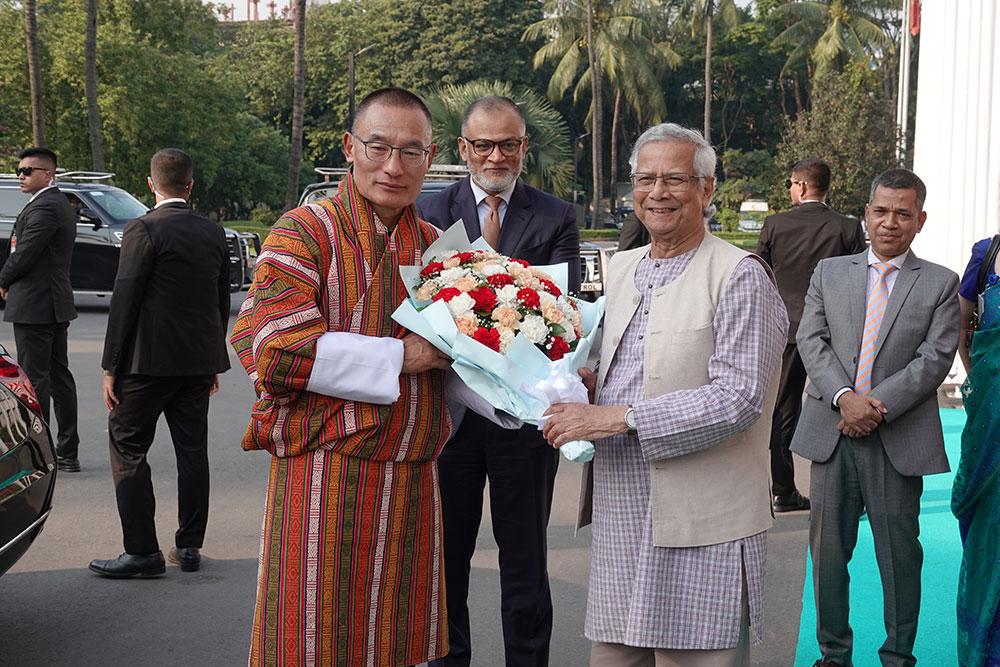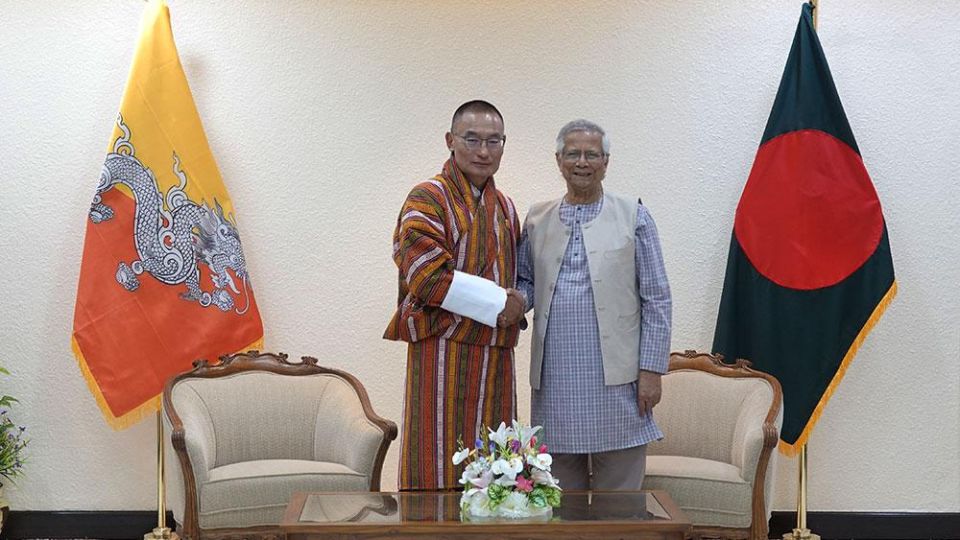November 25, 2025
DHAKA – Bhutan and Bangladesh are preparing to open a new phase of economic cooperation as Prime Minister Tshering Tobgay’s state visit to Bangladesh this week paved the way for deeper engagement in connectivity, trade, and cross-border services.
With discussions ranging from a future free trade agreement to expanded health and education partnerships, both governments signalled interest in broadening the scope of collaboration that has steadily grown over the past decades.
The Prime Minister is in Bangladesh from November 22 to 24 at the invitation of Professor Muhammad Yunus, Chief Adviser of the interim government of Bangladesh.

During the visit, Lyonchhen met senior government officials and private sector representatives to discuss cooperation in trade, sub-regional energy, transport, tourism, education, health and investment.
Officials from both sides said the exchanges would help reinforce existing arrangements while opening new areas of partnership.
Two Memoranda of Understanding (MoU) were signed during the visit. One covers the trade of international internet bandwidth and other telecommunications services, and the other relates to the appointment of health workers.
Bhutan, which relies heavily on imported bandwidth, expects the new arrangement to improve connectivity and reduce vulnerability to disruptions.
The MoU was signed between Bhutan’s Ambassador to Bangladesh, Karma Hamu Dorji, and Abdun Naser Khan, Secretary of Bangladesh’s Posts and Telecommunications Division.
Talks on a third international internet gateway in Bhutan have been underway for nearly a decade, and the new MoU is expected to support broader efforts to lower internet costs.
Under the health MoU, Bhutan will continue recruiting Bangladeshi health professionals to meet shortages in the health sector.
Bhutan has been receiving specialists from Bangladesh since 2020, and the agreement aims to build on this cooperation.
It was signed by Health Secretary Pemba Wangchuk and the Secretary of Bangladesh’s Health Services Division.
The partnership is expected to support staffing, capacity building and coordinated public health responses.
During the two leaders meeting, the Chief Interim Adviser’s office said he informed the delegation that Bangladesh is constructing a 1,000-bed hospital and a medical college in Nilphamari and invited Bhutanese nationals to access services and education once the facility becomes operational.
Lyonchhen thanked Bangladesh for increasing annual MBBS/BDS seats for Bhutanese students to thirty, a decision announced during His Majesty the King’s visit in 2024.
Bangladesh also conveyed support for the Gelephu Mindfulness City vision.
On trade, the two sides reviewed progress made by the Joint Working Group on developing the Bhutanese Special Economic Zone in Kurigram.
They also agreed to begin formal discussions on a free trade agreement. Bhutan and Bangladesh already operate a preferential trade agreement signed in 2020.
Prime Minister Tshering Tobgay said Bhutan hopes to conclude the Free Trade Agreement soon and expressed interest in becoming the first country to sign such a deal with Bangladesh.
The Chief Adviser said Bangladesh gives high priority to facilitating the movement of Bhutanese goods and has directed officials to clear Bhutanese containers without delay.
Tourism cooperation will be strengthened through a joint working group aimed at encouraging two-way travel.
Professor Yunus said he hopes more Bhutanese visitors will explore Bangladesh’s Buddhist heritage.
According to the joint statement, the two sides also reviewed progress under the Agreement on the Movement of Traffic-in-Transit, as the trial run of goods transport from Chattogram Port to Burimari nears completion.
Bangladesh proposed supplying pharmaceutical products to Bhutan on a Government-to-Government basis to support access to affordable medical supplies. Human resource development, connectivity and cultural cooperation were also featured in the discussions.
To support education ties, Bangladesh offered ten annual seats for Bhutanese students at the Bangladesh University of Engineering and Technology and one dedicated seat for a diploma in sports science at BKSP.
It also renewed the offer of home ground facilities for Bhutanese sports teams and committed to providing specialised training programmes for Bhutanese professionals.
Alongside official meetings with various partners, the Prime Minister yesterday also interacted with the Bhutanese community, including 121 students and seven other members working for various international organisations. He is returning to the country today.
Bhutan-Bangladesh relations
Bhutan was the first country to recognise Bangladesh’s independence in 1971, laying the foundation for a relationship built on political and economic cooperation.
The first bilateral trade agreement was signed in 1980, followed by the Preferential Trade Agreement in December 2020.
Bangladesh enjoys duty-free access to nearly 100 products in the Bhutanese market, while Bhutan exports 34 items duty-free to Bangladesh.
At a state banquet, the Chief interim Adviser spoke of the long ties between the two countries, grounded in history and mutual respect.
He added the bond between Bangladesh and Bhutan is rooted not only in diplomacy but in history, trust and heart for goodwill.
In return, Lyonchhen said the partnership has grown steadily across human resource development, trade and connectivity, and that both sides continue to build on this foundation.
He said the two Memoranda of Understanding signed between Bangladesh and Bhutan would further strengthen cooperation between the two countries.


